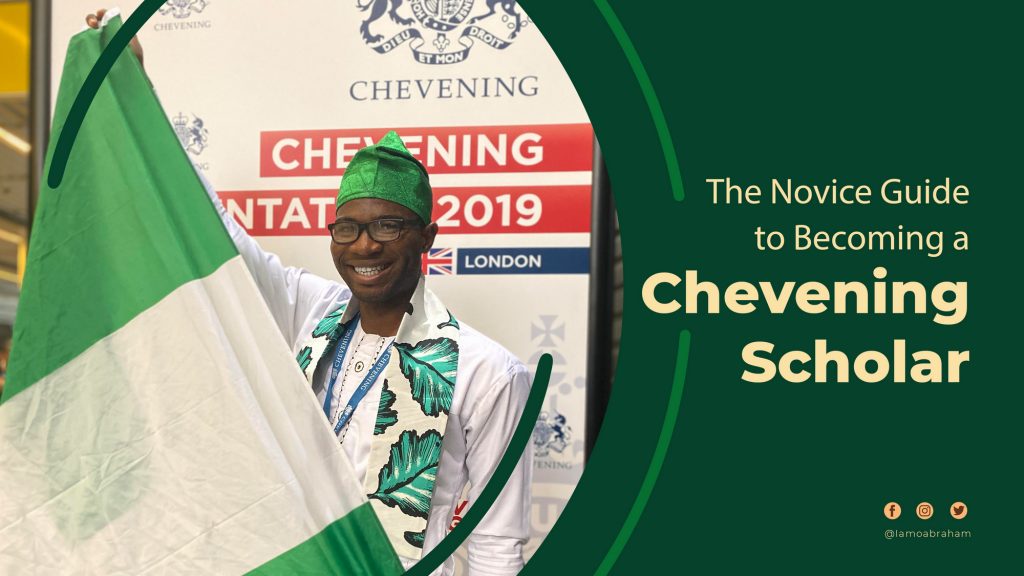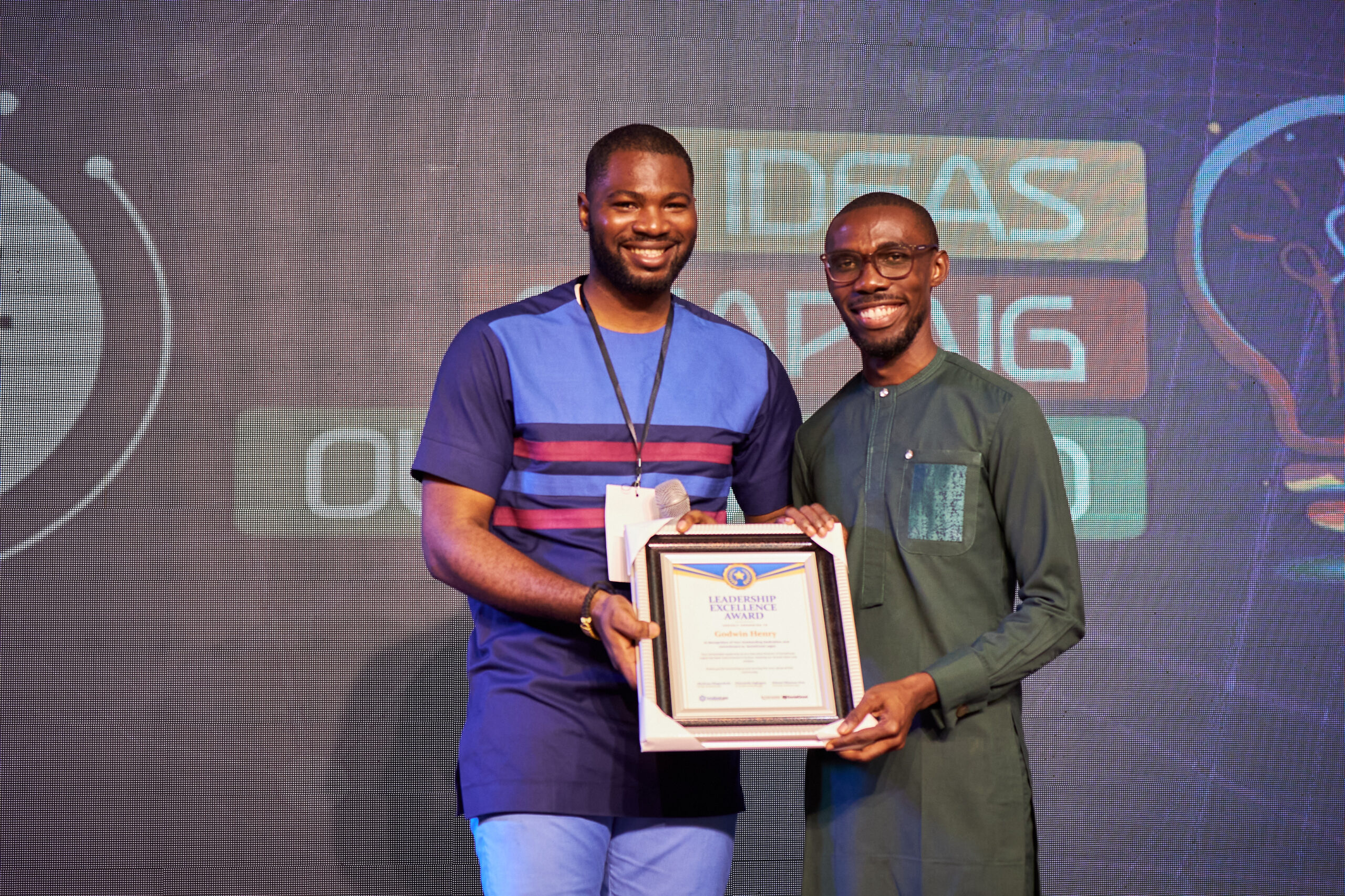
The Novice Guide to Becoming a Chevening Scholar [Plus Relevant Resources].

Last updated: 25/10/2023
Did you know I got selected as a 2019/2020 Chevening Scholar with application attempt?
Yes, your first trial can hit the Bulls-eye! It is interesting to note some people (particularly in the Nigerian community) ask me “How many times did you apply before you got it?”, each time they discover I am a Chevening scholar.
Before the year I applied (2018), I had known about the Chevening Awards for two years. Before you go through this guide, let me tell you the secret to a successful Chevening application – Research!
All the information you need is literally on the website – in addition to the numerous blogs and YouTube videos on the subject.
I am sharing my perspective on submitting a Chevening Awards application because I have had the opportunity to review some applications, and I keep getting more application review requests. At this rate, it is impossible to attend to every essay review request due to other commitments and work priorities.

I’m Not Reinventing the Wheel
Honestly, there is nothing I write about in the article that someone has not covered already. Also, Chevening has a great guide on its website. So here is what I am doing. This page is a central repository of all the resources I came across during my application process, in addition to any other resource I find useful for you. In addition, I commented on key subjects that require special attention and clarity.
Note: I’m focusing on the master’s scholarship process and not the fellowship.
What is Chevening?
It’s the UK Government scholarships and fellowships, Funded by the Foreign, Commonwealth and Development Office (FCDO) and partner organizations, that enable future leaders to study in the UK, whilst joining a global community of professionals who are creating positive change around the world. The Chevening program has a robust and rich network of over 57,000 alumni across 160 Countries.
Recommended Readings
Why is Chevening Relevant?
This is one of the opportunities that I have had access to that has transformed my career (by the number of brilliant minds I have been in contact with so far), shaped my perspective about the UK and the world; and given me a lifetime opportunity to build quality relationships with the UK (putting into perspective the strong bilateral relationship the UK has with Nigeria).
Also, Chevening offers an opportunity to study at any University of your choice in the UK. This gives you a wide range of selections to pick from. It provides the opportunity to access world-class education and experiences that, for many like me, would otherwise be out of reach, or take a longer time to attain.
Recommended Readings
- Five reasons to apply for a Chevening Scholarship
- 5 #ConfidentlySmart reasons to be a Chevening Scholar
- 35 Years – Chevening Impact Report
- Celebrating 40 Years of Chevening
Why Study in the UK?
This is one question you can’t escape during the entire application and selection process. You will find many blogs about this – I have recommended some that should be enough to help you develop your application. However, to make your application stand out, you should consider personal stories and experiences that can help you communicate uniquely.
Studying in the UK had been my plan for a few years – because some of the international creative and digital agencies that inspired the work I did at Bramo Digi (as at the time of my application) and my approach to communications technology for development are based in the UK. The UK Government Communications System (GOV.UK) has been a fascination for a while, especially the brand architecture of her agencies and commissions. In addition, the branding and reputation of several UK Universities and organizations like BBC built over the years – were things I was looking to explore during my study.
If you don’t want to sound like an article or point you picked from a blog, personalize your answer to this question. Why do I want to study in the UK?
Recommended Readings
Getting Started With Your Chevening Scholarships Application
When you read about Chevening and you come across the application portal and all these amazing past scholars, there is a possibility you begin to feel like you don’t stand a chance, and you may want to back out.
“There is no such thing as a ‘typical’ Chevening Scholar, but those who are successful tend to have ambition, leadership qualities, and a strong academic background.” – Chevening Website
Don’t write yourself off.
I know that feeling because I was there. I worked on my application for weeks and gave up a day before the official deadline. However, I believe God gave me a second chance when I discovered the deadline was extended for another 2 days. I pulled up my application draft and spent another 18 hours completing the process. If I had further disqualified myself, I would not have published this kind of article.
Some persons applied once, and some tried a couple of times – and from my observation, it is not solely dependent on the robust professional profile. You need to be able to articulate your responses to satisfy the questions with clear examples; being able to show a clear pattern of progressive professional and leadership development and the need for a Master’s degree. I will address this in detail later in this article. Read on.
Chevening Scholarships Eligibility
To be eligible for a Chevening Scholarship you must:
- Be a citizen of a Chevening-eligible country or territory.
- Return to your country of citizenship for a minimum of two years after your award has ended.
- Have completed all components of an undergraduate degree that will enable you to gain entry into a postgraduate programme at a UK university by the time you submit your application. This is typically equivalent to an upper second-class 2:1 honours degree in the UK but may be different depending on your course and university choice.
- Have at least two years of work experience (equivalent to 2,800 hours).
If you are a Nigerian, your National Youth Service Corps Experience counts.
- Apply to three different eligible UK university courses and receive an unconditional offer from one of these choices by 11 July 2024.
Learn more about eligibility | Learn more about the 2022/2023 Application Timeline.
On English Language Requirement
As of this time, Chevening no longer requires an English Language Test as part of the application process. However, you may still need to meet the language requirement for the individual school you are applying for.
Since I am quite proficient in the English Language, during my application year, I used some online platforms like IELTS Simon, IELTS Buddy, and IELTS Mentor, coupled with the official British Council IELTS Mobile App to study for the exam. I prepped for the exam in less than 1 month and got an Overall Band Score of 7.5. If English is not your first language and/or you are not proficient in it, give yourself enough time to prepare. That way you understand the format of each paper type and the techniques for excelling. This is just an extra tip for you in case your university still requires you to submit a proficiency certificate for the English Language.
In some cases, if you write directly to the admission office, with other proofs, such as publications, writings, and speaking videos, you can get a waiver.
Recommended Readings
- Work experience: Four key points to help you apply
- English Language Requirement – Chevening’s FAQs
- Application Timeline (2023/2024)
Chevening’s Application Essay Section
This is the core of the process – as you are expected to communicate why you should be selected as a Chevening Scholar. This is an award that receives over 50,000 applications yearly and less than 5% of that number would be selected. Also consider the financial investment of over £30,000, stipend and other allowances inclusive. You need to put your best foot forward. If anyone would invest that amount of money, you must sound convincing.
To have a full grasp of this process, please take your time to go through the official Chevening Application Guidance.
The essay will test you in four areas; Leadership, Networking, Course of Study, and Future Career Goals. You will answer each question with a minimum of 100 words and a maximum of 500 words.
At this point, I would give some pointers for each essay section – based on how I approached my application. Let’s dive!
First Thing – Reflection and Milestone Timeline.
The best thing you can do for yourself is to spend 1-2 hours reflecting on your life’s journey and designing what I call your “Milestone Timeline”. This is you tracking your life/professional growth timeline to highlight those significant events in your life and arranging them in chronological order. In this Milestone Timeline, we are highlighting both the positive and the so-called negative events in the form of headlines – recognizing that it’s the combination of these two types of events that shape our story at any given time.
Here is a synoptic example of what my timeline looked like at the time of my application:
- Graduated from High School – 2010
- Continuous struggle with identity, habits and low self-esteem – 2010
- Search for answers and solutions – 2010
- Discovery and excitement to share with other teenagers – 2011
- Created a Facebook Group – Royal Youths Forum – 2011
- Grew to 800 members in One Year – 2011
- Discovered Blogging, started one and later self-coded mine (Seasonedlifejournal.com.ng) – 2012
- Inspired to use my story and experience to teach young people on campus to use technology to drive socio-economic change (Leverage Conference) – 2015
- Started my speaking career in technology for good, leadership development and community development. – 2015
- Launched an ebook – No Excuse Challenge – 2016
- Launched my Digital Agency (To help Innovators and Changemakers use communications technologies for more impact) – 2016
- Leverage Conference, University of Ibadan – 2016
- Had a major identity breakdown – 2016
- Launched my Book – Lead Your Life – 2017
- Got Selected as an Obama, Young African Leader, West Africa – 2017
- Volunteered to offer technical support to the first YALI RLC, West Africa, Nigeria Alumni Chapter. Election – 2017
- Unanimously Appointed as Communications Chair of YALI RLC, West Africa, Nigeria Alumni Chapter. – 2017
- Worked with 4 other YALI RLC alumni to start a YALI Lagos Network Community – 2017
- Hosted a local meetup of the UN Foundation – Social Good Summit – 2017
- Leverage Conference, Lagos – 2017
- Published over 150 articles, over 520,000 views and 50,000 all-time readers on Seasoned Life Journal- 2018
- Merged Seasoned Life Journal with another organization to become The Leverage Africa – 2018
- Nominated as Associate Fellow, Royal Commonwealth Society – 2018
- Founded SocialGood Lagos, with 2 amazing friends – in 2018
- Served as a Delegate of UN Foundation +SocialGood Community at International Government Communications Forum, UAE – 2018
- Bramo Digi was awarded as Top 100 Emerging SMEs in Nigeria (Union Bank – Connect Nigeria – after working with over 30 social change brands in 4 West African Countries – in 2018
- Hosted second SocialGood Summit Lagos- 2018
- Selected as Global People’s Fellow – 2018
- Selected as an Ashoka Emerging Innovator – 2018
Remember, I said I didn’t think I stood a chance? After this exercise, I was like “Thank You, Jesus! At 23 years old, I am so proud of who I have become!” And I got the confidence to put my application forward.
I learnt a significant lesson. Many of us do not even appreciate our journey and choose to make other people the heroes! Honestly, I may have been comparing myself with some of my friends who do amazing stuff! This doesn’t change the fact that my story is also valid. With gratitude and proper reflection, we would see that we were not as bad as we thought!
This exercise helped me to find the consistent theme and focus of my passion, projects and business in those years. And it’s about Leadership and Technology – I have been committed to programs and projects that improve the leadership skills (on personal, organizational and community levels) of young people; and to helping these innovators and changemakers use communication technologies to amplify the impact of their work (a.k.a technology for SocialGood).
I also think this is relevant for those who have several entrepreneurial branches like me. Even though you may not have all figured it out yet, you need to be clear about the niche you are committed to from the start – so that you can build your story across each essay.
This is a very important exercise to help you dig out your leadership journey. You will be shocked by the kind of clarity you will get from this exercise. You can choose to design yours visually, in audio format or in whatever form appeals to you.
Leadership
Chevening is looking for individuals who will be future leaders or influencers in their home countries. Explain how you meet this requirement, using clear examples of your own leadership and influencing skills to support your answer.
What the reviewer would like to see here is your philosophy of leadership (in one or two lines), a clear example showing how you live up to your definition of leadership, and why that should qualify you for a Chevening Scholarship.
In giving an example, there are two ways you may want to approach this; you can use your milestone timeline (like I described above) to arrange your story in a connected and more narrative style. This was what I did – I picked 3 major milestones from my timeline and connected them – How I started Seasoned Life Journal; how it led to me starting Leverage Conference – and how that also led to me starting my Digital Agency (Bramo Digi). But my awards and recognition came in the last paragraph before my closing hook.
The other approach is to give a background story and narrow it down to 1 or 2 projects you have done or 1 or 2 professional scenarios in your career journey.
Whichever approach you use, make sure you highlight your contribution to the successful outcome of that event. The safest way to do this is by using the STAR APPROACH. What this means is to simply:
- Describe the Situation and when did it take place.
- Explain the Task and what was the objective
- Give details about the Action you took to achieve this.
- Close with the Result of your action.
Then you can follow up with a line of sentences highlighting what you learnt from that experience. I have included links below for further study and explanation.
Networking
Chevening is looking for individuals with strong professional relationship-building skills, who will engage with the Chevening community and influence and lead others in their chosen profession. Please explain how you build and maintain relationships in a professional capacity, using clear examples of how you currently do this and outline how you hope to use these skills in the future (minimum word count: 100 words; maximum word count: 500 words).
Similar to the leadership essay, what the reviewer would like to see here is what networking means to you (in one or two lines), how you build relationships and a clear example of how you have strategically benefitted from these relationships.
You may be tempted to want to share all the amazing connections you have, but you must understand why this question is relevant. One of the project objectives of Chevening is to “develop and nurture relationships between the UK and former Scholars. This allows the UK to engage with and invest in future leaders, helping us to work better together in the future.” You have to show that you can build long-term relationships with the Chevening network and the potential to be lifelong friends with the United Kingdom.
I recommend you show how you have used networking to drive the goals and leadership impact you described in your leadership essay; each essay question is an opportunity to elaborate more on who you are.
Course of Study
Outline why you have selected your chosen three university courses, and explain how this relates to your previous academic or professional experience and your plans for the future. Please do not duplicate the information you have entered on the work experience and education section of this form (minimum word count: 100 words, maximum word count: 500 words).
I did this with four (4) paragraphs – the introductory paragraph; 3 paragraphs outlining the relevance of each choice course and school; and a closing paragraph. I had to use my introductory paragraph to once again establish the transition from my first degree (which was a double major in Physics and Education) to my current interests, and how the need for a master’s degree will help enhance my academic and professional qualifications in media and communications, and how it links to my current work in international development.
Just for the record – I studied Media Practice for Development and Social Change at the University of Sussex.
Please try to avoid sounding like the information you see in your course module on the school’s website. Try to simplify the relevance of that module to your career interests. Research the school, the course, and even the professors convening the courses.
Once again, the key thing here is to offer insight into how these 3 courses will enhance your ability and capacity to further your career aspirations.
Must Read- University applications: four key points to help you apply.
Future Plans
Chevening is looking for individuals who have a clear post-study career plan. Please outline your immediate plans upon returning home and your longer-term career goals. You may wish to consider how these relate to what the UK government is doing in your country (minimum word count: 100 words, maximum word count: 500 words).
The question wants to see a clear plan upon return from the UK. Avoid writing all your future goals. The main call to action here is to show that you know what you want to do when you are back. Again, if you don’t know, act as if you know. Lol!
I divided mine into 6-12 months; 1-3 years and 3 to 5 years. I focused on 2 major ideas and elaborated my step-by-step plan using figures, estimation and dates. Of course, you have to link this to what the UK government is doing in your country. You have to do the research yourself.
Recommended Readings
- How to Succeed at Writing Applications
- The “Star” Approach To Writing Admissions Essays
- The Hero’s Journey – Mythic Structure of Joseph Campbell’s Monomyth
- Fourteen Scholarship Essay Examples That Won Thousands 2019
- University of Exeter – Star Approach Guide
- The Hero’s Journey Essay
- Success Tips for your Chevening Scholarship award application – [Dr Cassandra Akinde]
- Chevening Scholarships – Terms and Conditions – Official
My Lessons From the Application Process
- Patience – It was a long process that tested my faith and the ability to wait. It’s an 8-month-long process!
- Reflection – The questions got me thinking about my professional and leadership journey, and I got to discover many unexplored parts of my journey and interests.
- Mentorship – I didn’t have anyone review my application, but I was detailed about all the instructions and guides I got from videos and blogs of past scholars, in addition to Chevening application guidelines and personal research.
Other Things to Pay attention to
- Describe scenarios with clear details, such as dates, and statistics, so you can paint a vivid picture.
- Don’t leave your reviewer to assume anything – from statements to abbreviations to the local context. Don’t just say things like “I supported Dr. Joke…” explain what your support entailed.
- Be yourself; be honest; be humble; and demonstrate passion.
- Ensure you link your study plan to your long-term goals.
- Get other people to read your essays.
Other Recommended Readings
- Longlists, shortlists, references, and interviews
- KPMG – Chevening Evaluation 2016
- Common Errors with Chevening Application
- Frequently Asked Questions – Chevening Official Answers
- How To WIn A Chevening Scholarship, 2023
I Hope This Helps!
As I mentioned, I will not be able to take any more reviews at the moment. Please feel free to ask me questions in the comment section below to ask your questions or send me an email – hello(at)abrahamologundudu.com. In the coming weeks, I will update this article with other tips needed for the other stages of the application process. I hope you find it helpful as you share it with your friends.
Disclaimer: These are totally ideas based on my experience and should not be taken as Chevening’s Official Guide.
Author
Abraham Ologundudu
I am a designer and strategist working at the intersection of design, technology, and social change, where identity, leadership, and systems are shaped. I write to explore meaning, structure, and transformation, from personal leadership to societal systems.
Comments
-
-
Rosmary
This is really insightful. Thank you for this. I particularly became more self confident when I read the part that speaks to ” no typical chevening scholar”.
-
-
Mutiat Mustapha
Reading through this articles has given me a fresh POV of the whole Chevening Scholarship. Thank you, Abraham.
-
-
Leave a Reply Cancel reply
This site uses Akismet to reduce spam. Learn how your comment data is processed.




Vivian
This article is refreshingly useful. I’ve read through others that were really good too but this one has it’s own spice which I love. Well done. Thanks for the idea of the milestone timeline. You really have milestones. I may not be able to go through all the videos and links because the deadline is so close, but I’ll give my best shot. Hopefully it works out. Perhaps it doesn’t, I’ll deepen my research, impact, etc and give it a shot until I get this. Thanks Abraham.